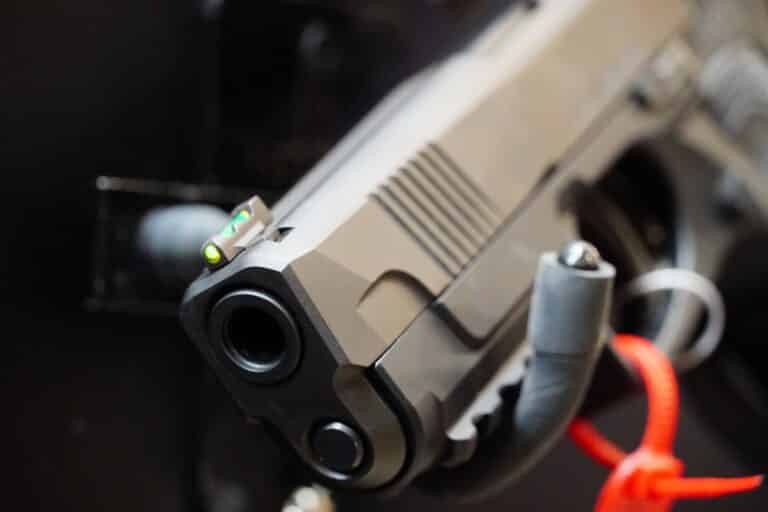A new federal appeals court ruling relied heavily on the Supreme Court’s precedent in US v. Rahimi to uphold the domestic violence misdemeanor gun ban.
On Wednesday, a unanimous Fourth Circuit panel dismissed a facial challenge to the federal prohibition on gun possession by domestic abusers. It argued the case asked very similar questions to those addressed in Rahimi and, thus, the panel came to the same conclusion as the High Court. That makes it one of only a handful of federal appeals courts to broadly apply the Supreme Court’s most recent Second Amendment case, which has not left as much of an impact on lower courts as the Justices may have hoped.
“The historical regulatory tradition Rahimi relied on to uphold the constitutionality of § 922(g)(8) under Bruen’s framework is materially indistinguishable from how that same tradition would apply to § 922(g)(9),” Judge G. Steven Agee wrote for the court in US v. Nutter. “As was true of § 922(g)(8), when enacting § 922(g)(9), Congress was ‘restrict[ing] gun use to mitigate demonstrated threats of physical violence, just as surety and going armed laws do.’ And although none of the Founding Era limitations Rahimi relied on match § 922(g)(9) any more than they did § 922(g)(8), Rahimi made it clear that they need not do so to be ‘relevantly similar’ for purposes of Bruen. An ‘analogue’ suffices. Thus, as was true in Rahimi, § 922(g)(9) ‘s purpose and method—i.e., its ‘why’ and the ‘how’—fall within the Nation’s historical tradition.”
After a district court initially ruled the federal gun prohibition for domestic abusers “fits easily within” the history and tradition of disarming people deemed “a threat to the public safety,” as the High Court’s 2022 New York State Rifle and Pistol Association v. Bruen precedent requires, defendant David Nutter appealed. He argued that finding was wrong and there is no historical tradition of disarming abusers to be found in or around the Founding Era as Bruen demands. However, he didn’t find any more sympathetic ears on the three-judge appeals panel.
Judge Agee, a George W. Bush appointee, instead outlined the panel’s view of how to properly do the Breun test for domestic violence disarmament in light of Rahimi.
“At its core, Rahimi held that ‘our Nation’s tradition of firearm regulation distinguishes citizens who have been found to pose a credible threat to the physical safety of others from those who have not’ and ‘allows the Government to disarm individuals who present a credible threat to the physical safety of others.'” he wrote. “‘Section 922(g)(9), which categorically disarms individuals with valid, domestic-violence convictions, fits well within this historical tradition.’ As the definition of a ‘misdemeanor crime of domestic violence’ confirms, every individual that § 922(g)(9) would disarm has been convicted of an offense in which they had been adjudicated by a court of law to have used or attempted to use physical force or threatened the use of deadly force against their victim. § 921(a)(33)(A).”
Nutter argued the domestic violence misdemeanor gun ban was distinct from the one connected to the restraining order gun ban because it is permanent. He noted the temporary nature of Rahimi’s gun prohibition was a key factor in the Supreme Court’s decision to uphold that ban. But Judge Agee rejected that distinction as not meaningful because, he reasoned, at least some charges brought over illegal possession under the misdemeanor ban happen shortly after it is imposed.
“True, Rahimi noted the temporary nature of the restraining order at issue in § 922(g)(8) as part of its reasoning,” he wrote. “But that does not meaningfully distinguish § 922(g)(9), at least with regard to a facial challenge, because it still has a ‘plainly legitimate sweep.’ Put differently, § 922(g)(9) ‘s facial constitutionalitydoes not falter in light of this temporal argument because some § 922(g)(9) convictions arebrought within relatively close proximity to the predicate misdemeanor conviction andadditional fact-specific circumstances—such as the nature or number of the offenses—could otherwise support disarmament.”
While Nutter had made some attempt to argue the law was unconstitutional as applied to his decades-old convictions in addition to on its face, the court ruled he didn’t make that claim properly and only the facial challenge was valid. To that end, it also noted the prohibition wasn’t necessarily a lifetime gun ban because there are several avenues for defendants to have their convictions wiped out or rights restored.
“Among other things, it would not prohibit firearm possession by those whose convictions have been set aside, pardoned, or expunged, nor would it apply to those who have had their civil rights fully restored, unless the condition of any of those events expressly prohibited firearms-related conduct,” Judge Agee wrote. “Moreover, if the underlying conviction involved a misdemeanor crime of domestic violence ‘against an individual in a dating relationship,’ then the conviction would exclude the defendant from § 922(g)(9) ‘s scope ‘if 5 years have elapsed from the later of the judgment of conviction or the completion of the person’s custodial or supervisory sentence, if any, and the person has not subsequently been convicted of another such offense.'”
Judge Agee further argued the Supreme Court only noted the temporary nature of the restraining order ban as part of the discussion surrounding how it is applied, and the Court might view the misdemeanor ban differently.
“Nutter’s temporal argument also discounts that, at least in part, the SupremeCourt’s concern with the temporal limits of § 922(g)(8) related to the correspondinglylower standards that apply to obtain a restraining order, while § 922(g)(9) ‘s longerprohibition flows from a correspondingly higher standard to obtaining a conviction,” he wrote.
The panel concluded domestic violence convictions are equally as justifiable a reason on their face to disarm somebody under the Second Amendment as domestic violence restraining orders. Although, it did leave room open for a potential as-applied challenge for somebody, potentially even Nutter himself, who has been subject to the prohibition for an extended period of time.
“Arguments that a prior conviction should not permanently ban an individual from possessing firearms based on the amount of time that has lapsed since a conviction or a defendant’s purported rehabilitation are better suited to as-applied challenges or as policy arguments to Congress to advocate amending the statutory language,” Judge Agee wrote. “They are not concerns that would render § 922(g)(9) unconstitutional on its face.”






